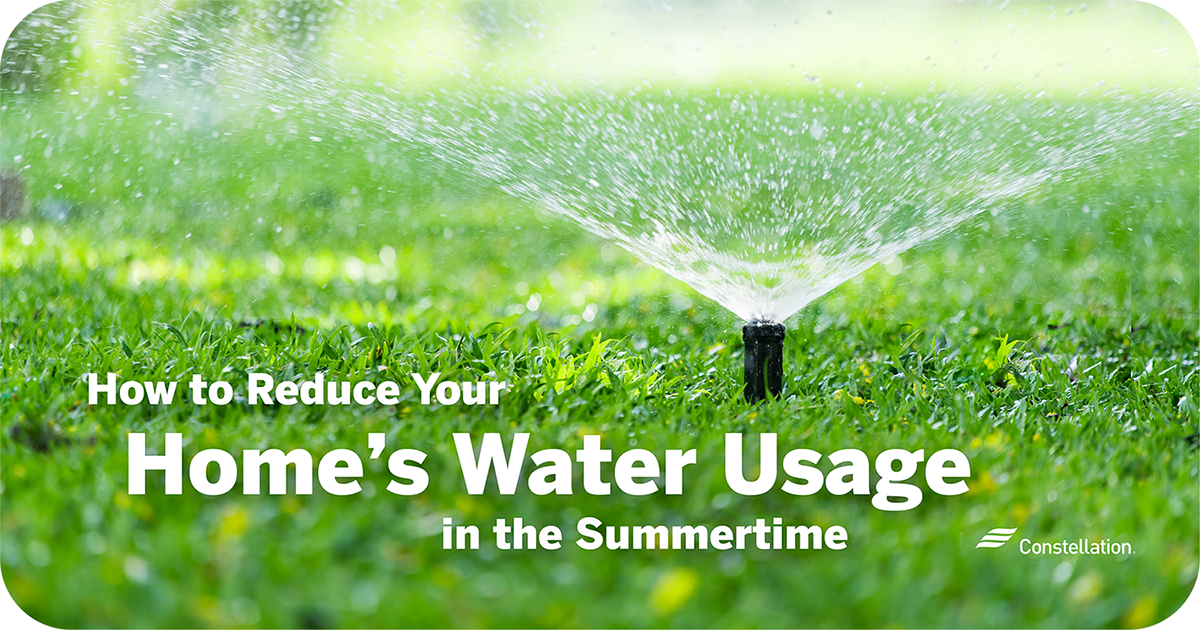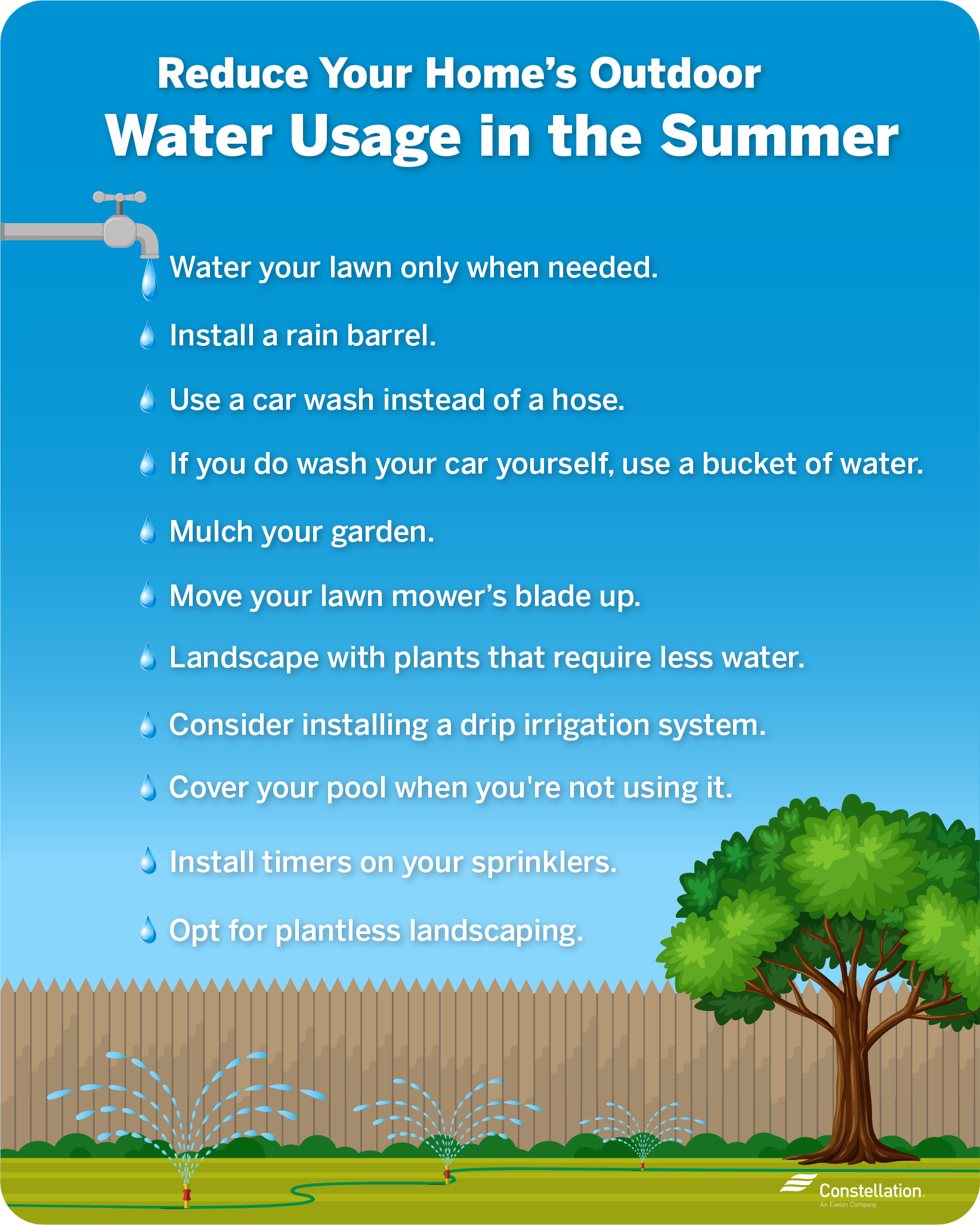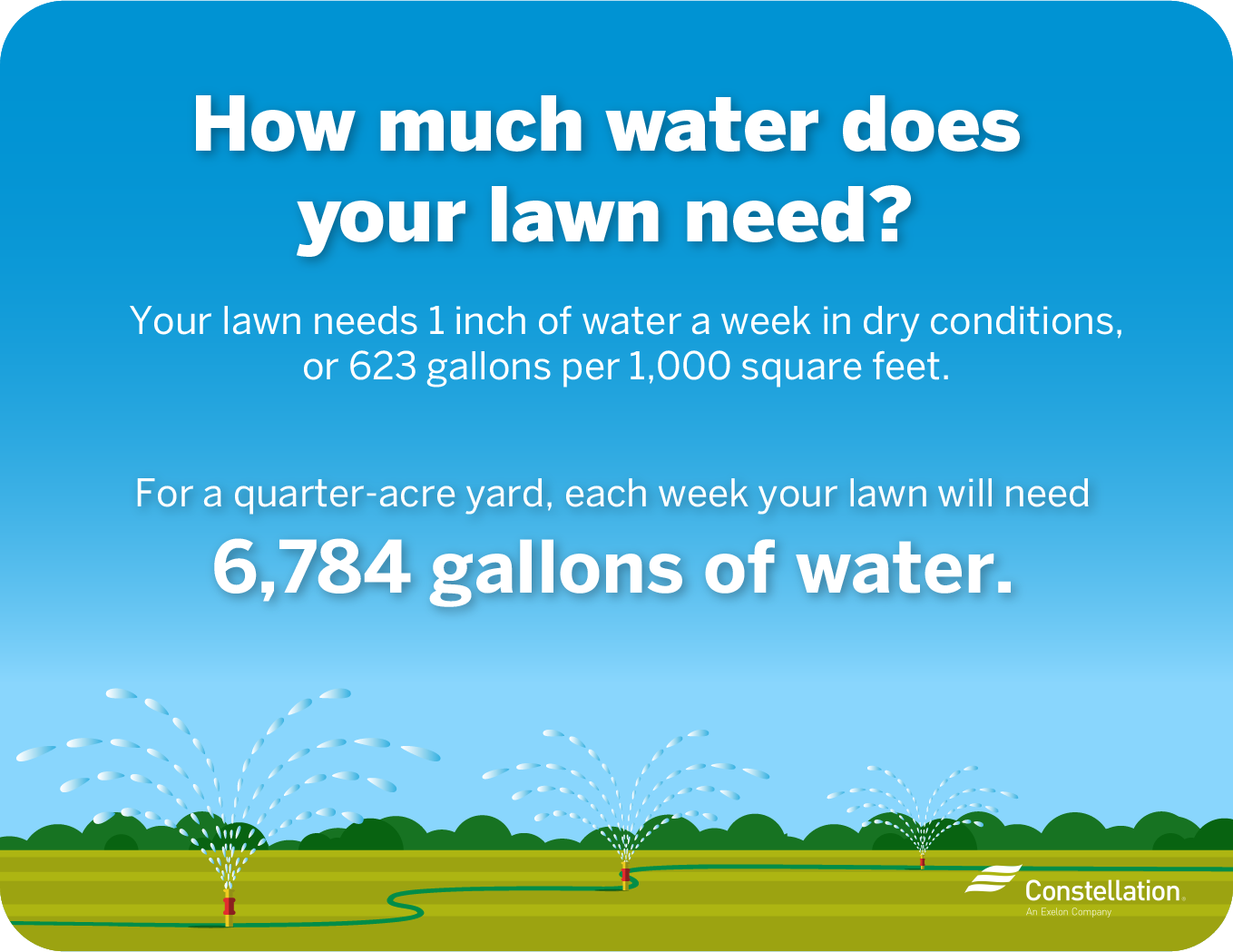
- Category:
Home Energy Savings -
Last updated:
July 17, 2024
How to Reduce Your Home’s Water Usage in the Summertime
Like many natural resources, fresh, clean water is not in endless supply, even though it might seem that way. It’s always a good idea to use it with care to make sure we have enough. But smart home water usage isn’t just about ensuring a reliable water supply.
Producing water takes energy — a cost that’s passed along to you, the consumer. And your home can use quite a bit of water during the hot summer months. So finding ways to save water outdoors in the summer can not only conserve a precious resource but also help lower your water bill.
Why is your water bill higher in the summer?
We all tend to use more water in hotter months, which is why your water bill is high. Summer weather makes us use more water at home in many ways, including:
- Sprinklers. Lawn water usage increases in hot, dry months. When there’s less rain, your lawn can need a lot of water to make up the difference.
- Pools. A major use of water in the summer is filling the swimming pool. During hot, dry periods, you lose water to evaporation. That means you’ll have to keep adding water, which drives up your water usage.
- Showers to cool off. A refreshing shower after spending time outside in hot, humid weather is a real treat. Taking more frequent showers is common when it’s hot outside.
- More laundry. Spending more time outdoors and sweating in the heat creates more dirty clothes. And running your washer more often ups home water usage.
- More guests. If you have visitors over the summer, you have more people drinking water, more people showering and more people doing laundry.
- Evaporative coolers. An energy-efficient way to cool your home if you live in a dry climate is to use a swamp cooler. It uses evaporating water to cool the air, so by its nature, such a device continually uses water. Water usage will vary by climate and type of unit, but you could use several gallons per hour and a few thousand per month.
8 ways to reduce your home’s indoor water usage during the summer months
If you’re trying to figure out how to save water in the summer, focusing on the outdoors isn’t enough. You also want to find ways to reduce home water usage indoors, including:
- Wash full loads of laundry, only when needed. Your washing machine will be more efficient if you run full loads. You won’t run it as often, and you’ll make the most efficient use of water with each cycle.
- Fix faucets that drip. Water lost to leaky faucets is a true waste, offering no benefit for water used. And that lost water can add up if you don’t fix the problem.
- Use dehumidifier water for your plants. Your plants don’t need fresh tap water. In fact, additives like chlorine and fluoride aren’t good for them. A dehumidifier pulls water out of the air, making you feel cooler. You can then use the chemical-free water for your plants.
- Take showers instead of baths. The amount of water you use in a shower is much less than in the average bath. You can save even more water if you take a short shower.
- Replace your traditional showerhead with a low-flow model. A low-flow showerhead gives you the feeling of normal pressure while actually using less water.
- Install a water softener. One of the big differences between hard and soft water is that soap doesn’t work as well with hard water. You’ll have to run longer wash and rinse cycles to get the same clean.
- Keep pitchers of chilled water in the fridge. If you store cool water in the refrigerator, you’ll always have something refreshing to drink on hand. You won’t have to run the water waiting for it to get cold.
- Defrost food in the refrigerator instead of under running water. Another way to save water in the summer — and year-round — is to defrost food in the refrigerator. It will safely, slowly thaw without the risk of growing harmful microbes. Defrosting under running water wastes many gallons, and it doesn’t evenly defrost your food.
11 ways to save water outdoors in the summer
Lowering outdoor water use is a big part of how to save water in the summer. You may want to try any of the following ideas:

- Water your lawn only when needed. Water your lawn just enough to keep it healthy during times of low rainfall. Watering early in the morning gives a chance for the water to soak into the ground. If you water during the heat of the day, much of the water will evaporate.
- Install a rain barrel. An old-fashioned but still effective way to conserve water is to use a rain barrel. Your plants will appreciate the chemical-free water, and it can help if your water bill is high.
- Use a car wash instead of a hose. Use a commercial car wash to keep your car looking good. Many use water-conserving equipment and recycle rinse water.
- If you do wash your car yourself, use a bucket of water. If you don’t want to go to the car wash, one way of saving water outdoors is to rinse your vehicle with a bucket. Running a hose the whole time will use significantly more water.
- Mulch your garden. You want as much moisture to get to the roots of your plantings as possible. Applying a layer of mulch slows evaporation, allowing the soil to retain water.
- Move your lawn mower’s blade up. If you cut your grass too close to its roots, you expose the soil to the hot rays of the sun. You can dry out the soil quickly and burn your grass. Leaving your grass blades longer creates shade and cuts down loss of water to evaporation.
- Landscape with plants that require less water. Grass is notoriously thirsty. Plants that don’t need so much water and that can flourish through droughts are an attractive and hardy alternative.
- Consider installing a drip irrigation system. Drip irrigation systems apply water directly to the roots of plants in a slow, even manner. You’ll lose less water to evaporation and runoff.
- Install timers on your sprinklers. You can set a time to start the sprinklers and stop them. This keeps you from wasting water by letting hoses run if you forget to turn them off.
- Cover your pool when you’re not using it. This is a simple but effective way of saving water outdoors. You can really cut down on water evaporation if you cover your pool, especially in the middle of the day. Depending on the size of your pool, you can lose a few inches a week if you leave it uncovered.
- Opt for plantless landscaping. When you stop and consider how much water is used to water the lawn, you might want to think of alternatives to thirsty grass and plants. Rock gardens and terraces don’t use water, are easy to maintain and add interest to your property.
How much water does a garden use?
Plants need the most water at the height of the growing season, about 1 inch of water per week. (You need about half that in the spring and fall.) That means about 0.623 gallons per square foot of garden. So, for a 32-square-foot vegetable garden, you’ll need about 20 gallons a week during the summer.
Tip: You can save water outdoors by using recycled water or rainwater for your garden.
How much water does your lawn need?

Without regular rain, your lawn can quickly dry out and die. The rule of thumb is to water your lawn with 1 inch of water a week, or one-half inch of water twice a week, same as your garden. It’s the right amount for a good soaking that seeps deep enough into the soil to get to the roots of your grass. If you apply less, you just dampen the surface and lose most of the water to evaporation. More than that and you waste water to runoff.
One inch of water equates to 0.623 gallons of water per square foot of lawn. That’s 623 gallons per 1,000 square feet. If you’re watering a quarter-acre, you’ll need 6,784 gallons of water per week.
Saving water — outdoors and indoors — during the summer is much easier than you may think. It’s really just a matter of cutting out the water waste you would have wanted to eliminate anyway. By making a few simple changes to your home and your family’s habits, you can use less water in the summertime. It’s a win-win: You get to conserve an important natural resource while also doing your part to lower your water bill.




